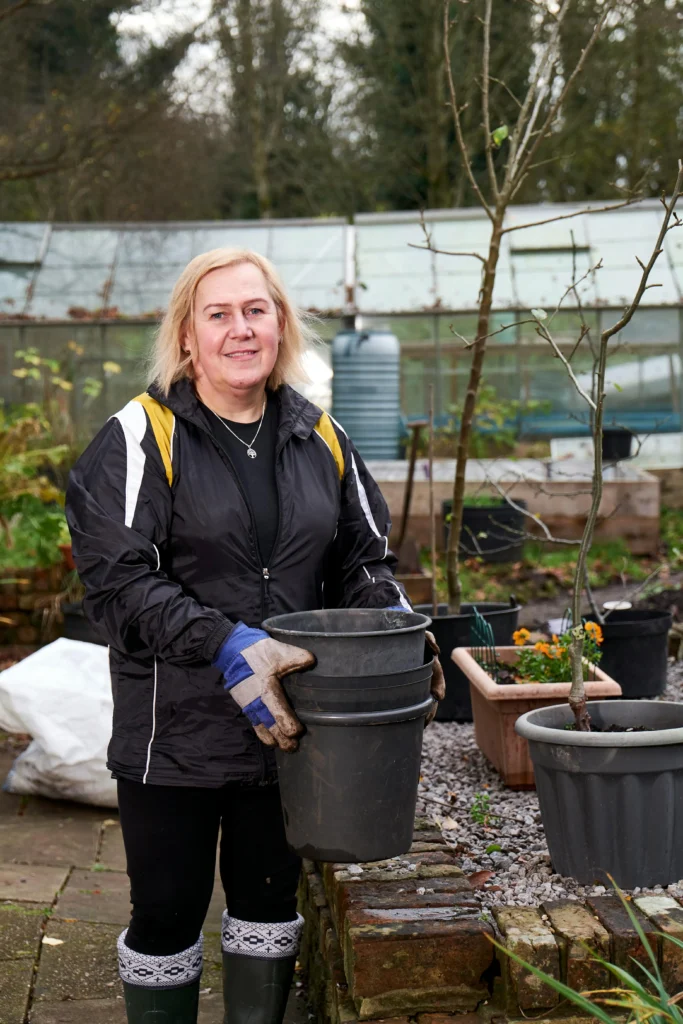In an age where screen time often eclipses sunlight and high-stress lifestyles have become the norm, the quest for holistic well-being has become more urgent than ever.
Could the remedy for this collective malaise lie dormant in our very backyards? Indeed, gardening is more than just a leisurely pastime or a way to beautify your surroundings.
It’s an activity with potential for significant physical and emotional revitalization.
In this article, we’ll explore how gardening benefits you mentally and physically, inviting you to step into a garden where well-being naturally takes root and flourishes.
So, as you read this guide by MapleScapes, consider how tending to your garden might also be a way of tending to your health, offering a harmonious blend of physical exertion, mental clarity, and emotional upliftment.
A Mood Uplifter
Engaging with plants and immersing oneself in the natural environment can have a profound impact on emotional wellness.
Simple acts like sowing seeds, pruning branches, or inhaling the scent of a blooming flower can do wonders for your mood.
Beyond these immediate sensory delights, caring for living organisms creates an ongoing sense of responsibility and a rewarding feeling of accomplishment.
This feeling is more than just momentary satisfaction; it has cumulative effects that can substantially improve your mental health.
Ease Tension and Anxiety
There’s something innately tranquil about the rhythmic processes involved in gardening: the repetitive motions of raking, digging, and planting, the habitual cycles of growth and decay.
These processes offer an effective antidote to the complexities and tensions of modern life.
Studies have shown that gardening can result in lower levels of the stress hormone cortisol, offering a biologically substantiated form of relaxation and mental restfulness.
This is particularly important for people who are self-employed, as they may not be able to set aside as much time for leisure as they’d like.

Realign Your Sleep Cycle
Engaging in gardening offers more than just daytime rewards; it also contributes to better sleep quality, further exemplifying how much gardening can benefit you mentally and physically.
The exposure to natural daylight while working in the garden helps regulate your internal biological clock, also known as the circadian rhythm. This alignment makes it easier to fall asleep and wake up consistently, improving your overall sleep quality.
In addition, the various physical tasks involved in gardening, from digging to planting and weeding, create a healthy form of exhaustion. This physical tiredness ensures that your body is primed for deep, restorative sleep when night falls.
An Exercise for the Body
Gardening is a multifaceted activity that engages not only your mind and emotions but also your body in a physically demanding way.
Whether turning soil, hauling bags of mulch, lifting pots, or stooping to eradicate invasive weeds, you’re participating in various movements that challenge different muscle groups.
These rigorous activities engage and tone muscles, from your legs and back to your arms and core. In addition, the postures required for practical gardening can promote spinal alignment, encouraging better posture and reducing the risk of back problems.
The exertion involved also provides a form of low-impact cardiovascular exercise that is beneficial for heart health.

Cardiovascular Benefits
The holistic benefits of gardening reach far and wide, touching even the most vital human organs: our heart. The physical exertion involved in garden work, though moderate, contributes to better cardiovascular health by getting your heart pumping and your blood flowing.
Coupled with the fresh air gardening in the open provides, this physical activity can significantly reduce stress levels, another key factor in heart disease.
The cumulative effect of these elements leads to noticeable improvements in vital metrics, such as lower blood pressure and better cholesterol levels.
Studies have shown that people who engage in regular gardening activities are at a lower risk of developing heart-related issues than those who don’t.
An Immunity Boost
When you dig into the earth to plant your garden, you’re doing more than sowing seeds; you’re also contacting an array of soil-based microorganisms.
Contrary to what one might expect, these microorganisms are generally not harmful. Many can actively stimulate your immune system, enhancing your body’s ability to prevent diseases.
This exposure to beneficial bacteria acts like a natural vaccine, strengthening your body’s defenses against various potential ailments.
Soil-based organisms like Mycobacterium vaccae have even reduced symptoms of asthma, allergies, and psoriasis.
Cognitive Longevity
It’s easy to dismiss gardening as a mere hobby, overlooking the considerable cognitive engagement it requires.
From meticulously planning garden layouts to discerning the unique needs of various plants, gardening offers a complex set of challenges that stimulate the mind. These mental activities serve as a form of cognitive exercise, strengthening neural pathways and enhancing problem-solving skills.
Regularly engaging in this kind of mental workout can serve as a buffer against age-related cognitive decline.
Moreover, studies suggest that such active mental engagement can provide a natural means of reducing the risk of developing dementia and other cognitive disorders.

Indeed, gardening is more than just a way to spruce up your outdoor space; it’s a multifaceted activity that benefits you mentally and physically.
The emotional satisfaction gained from nurturing plants and the genuine stress relief experienced, makes your garden a sanctuary of holistic health.
Moreover, the bodily exertion involved in digging, planting, and weeding contributes to overall physical fitness.
So, now is the moment to seize your favored gardening tools and cultivate your sanctuary of comprehensive well-being.





